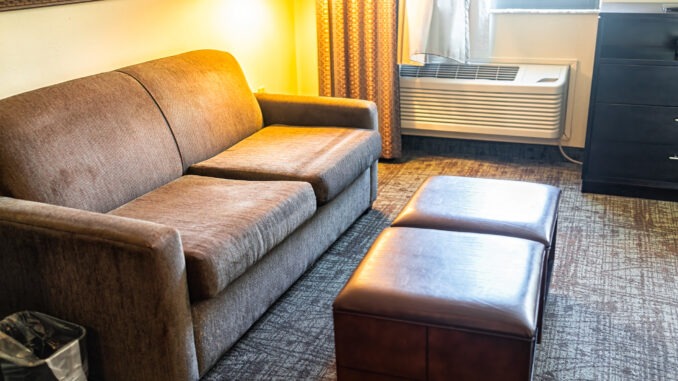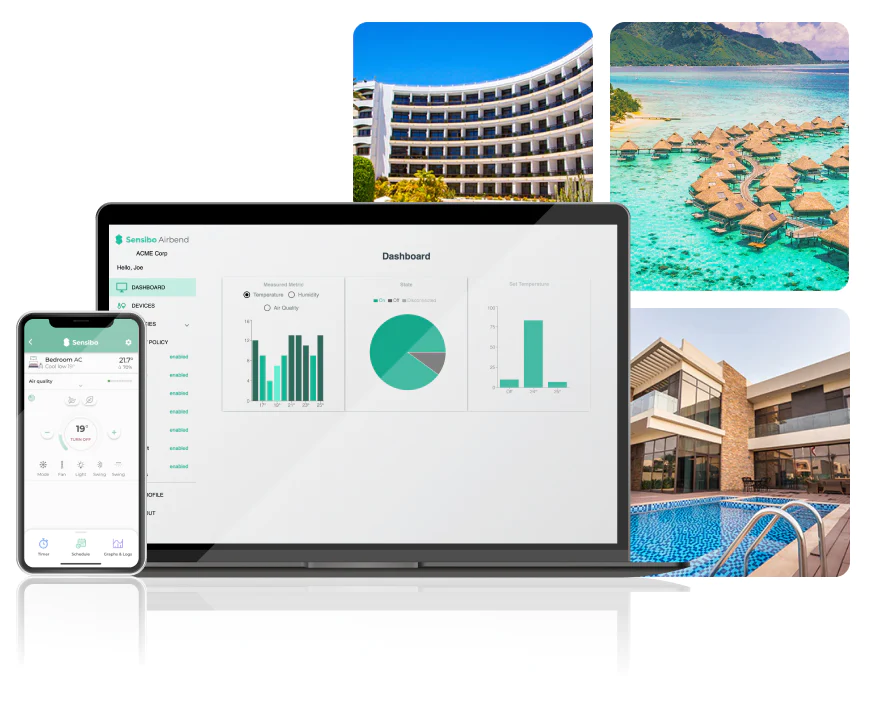
By Ran Roth, CEO & co-Founder of Sensibo - 1.31.2024
In the ever-evolving landscape of hospitality, the pursuit of sustainability has become more than just a trend—it’s a necessity. Hotels, with their constant demand for heating and cooling, stand at the forefront of this environmental challenge. Traditional HVAC systems, operating on fixed schedules, contribute to energy wastage, environmental strain, and increased operational costs. Hotel managers are left grappling with inefficiencies resulting from guests leaving rooms with AC on for extended periods.
Enter smart hotels, a technological leap that promises not only increased efficiency but also a significant reduction in the carbon footprint associated with hotel energy consumption. However, for widespread adoption to occur, hotel managers must overcome certain challenges. Upfront costs associated with retrofitting existing structures and implementing smart hotel technologies such as smart dashboards can be substantial. Hotel owners and operators must weigh these initial investments against the long-term benefits of reduced operational expenses and enhanced sustainability.
Traditionally, hotels have relied on conventional HVAC systems that operate on predetermined schedules, often wasting energy by cooling or heating empty rooms, such as guests leaving their rooms with the AC on for many hours. This outdated approach not only puts a strain on the environment but also impacts operational costs. Smart hotels, equipped with cutting-edge technology, offer a compelling solution to this dilemma.
Government incentives and industry collaborations can play a pivotal role in encouraging the adoption of smart hotel technologies. Financial support, tax breaks, and educational initiatives can alleviate some of the barriers that hotels face when transitioning to more sustainable practices. The US Inflation Reduction Act, introduced in 2021, incentivizes this change by allocating $362 million for a commercial energy efficiency tax deduction.
The U.S. Department of Energy reports that substantial investments and focused initiatives are aimed at enhancing the efficiency and utilization of buildings, representing 39% of the nation’s primary energy consumption and 76% of its electricity usage. One of the key advantages of smart hotels lies in their ability to adapt to dynamic environmental conditions. Smart hotels leverage advanced sensors and AI algorithms, offering hotel managers dashboards with real-time insights into occupancy levels, weather patterns, and energy consumption. By intelligently adjusting temperature settings in a smart dashboard based on occupancy and external factors, hotel managers can optimize energy usage by up to 40%, reducing waste and cutting down on unnecessary expenses.
Moreover, smart hotels excel in predictive analytics, enabling hotel managers to anticipate peak usage times and adjust heating and cooling systems via dashboards accordingly. This not only ensures guest comfort but also prevents energy spikes during high-demand periods, contributing to a more stable and sustainable energy grid.

A prime example of the positive impact of smart hotels is the integration of IoT (Internet of Things) devices. These devices, such as smart thermostats and occupancy sensors, provide hotel management with granular control over each room’s climate settings. This level of precision not only enhances guest satisfaction by allowing them to personalize their environment but also contributes to substantial energy savings by avoiding over-conditioning unoccupied spaces.
In addition to operational benefits, embracing smart hotel technology aligns hotels with global sustainability goals, as ESG is higher on the agenda for the hotel industry worldwide. The hospitality industry is a significant contributor to carbon emissions, and the adoption of smart technologies for hotels represents a tangible commitment to reducing environmental impact. Forward-thinking hotel managers are finding that investing in green technology and smart dashboards not only aligns with their corporate social responsibility initiatives but also enhances their brand reputation, attracting environmentally conscious guests. An example of this can be seen in a study produced by the International Journal of Hospitality Management, where constituents educated on the issues share a preference for staying in eco-friendly accommodations. They reported, “61% of global travelers prefer visiting eco-friendly hotels (Statista, 2020). Similarly, according to i-Scoop (2020), approximately 33% of guests at the Hilton group of hotels reported that its eco-friendly characteristics were the prime reason for their stay.”
In conclusion, the marriage of smart hotels and energy management represents a significant leap forward for hotels in the realm of heating and cooling. The adoption of these technologies not only improves operational efficiency and guest satisfaction but also positions hotels as leaders in the global effort to combat climate change. As the hospitality industry continues to evolve, smart dashboards are more than just a luxury—they are a vital component of a sustainable and responsible future.
 Ran Roth is the CEO & co-Founder of Sensibo, a leading Climate Tech company combining smart heating and cooling devices with a more sustainable world. The company recently launched Sensibo Airbend: a new software allowing hotels to manage air conditioning and air quality monitoring devices in bulk, reducing heating and cooling costs, while ensuring healthy air quality for their guests. Sensibo Airbend can lead to savings of over 40% on energy bills by optimized monitoring and management of all ACs in the hotel. Ran started his academia during his high school and served in unit 8200 in the IDF. He continued to obtain a B.Sc. in physics and math and an M.Sc. in computer science. Ran has led teams in successful startups such as Mobileye (sold to Intel for $15bn) and Dapper (sold to Yahoo! for $55M) focusing on Big Data and sensors. In Sensibo, he is directing the company’s future strategy and roadmap.
Ran Roth is the CEO & co-Founder of Sensibo, a leading Climate Tech company combining smart heating and cooling devices with a more sustainable world. The company recently launched Sensibo Airbend: a new software allowing hotels to manage air conditioning and air quality monitoring devices in bulk, reducing heating and cooling costs, while ensuring healthy air quality for their guests. Sensibo Airbend can lead to savings of over 40% on energy bills by optimized monitoring and management of all ACs in the hotel. Ran started his academia during his high school and served in unit 8200 in the IDF. He continued to obtain a B.Sc. in physics and math and an M.Sc. in computer science. Ran has led teams in successful startups such as Mobileye (sold to Intel for $15bn) and Dapper (sold to Yahoo! for $55M) focusing on Big Data and sensors. In Sensibo, he is directing the company’s future strategy and roadmap.
Are you an industry thought leader with a point of view on hotel technology that you would like to share with our readers? If so, we invite you to review our editorial guidelines and submit your article for publishing consideration.
